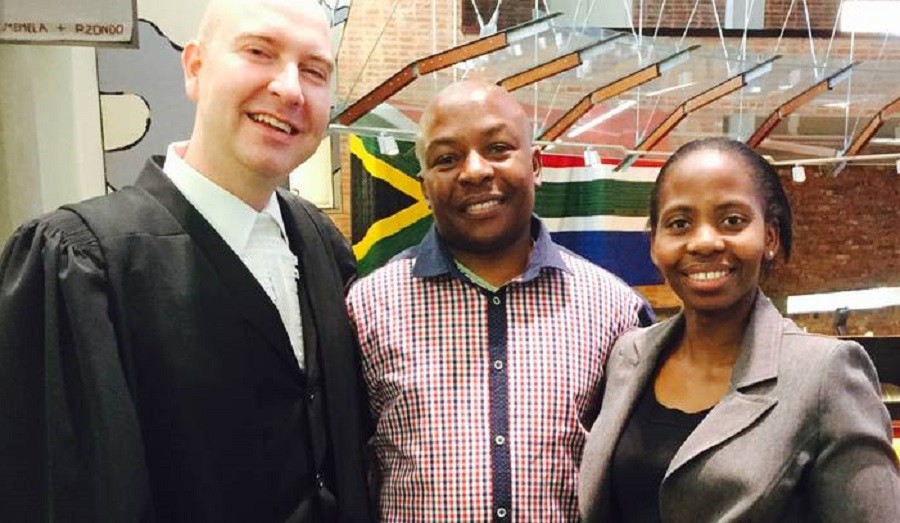
Wrongly Jailed for 13 Years, He Fought for His Freedom
From early childhood, electronics whizz Boswell Mhlongo spent his time tinkering with TVs, broken irons and kettles. In adulthood, after being sentenced to life imprisonment for the murder of a policeman, Mhlongo discovered he was also a computer boff – a talent that enabled him to access an on-line dating site from the confines of […]
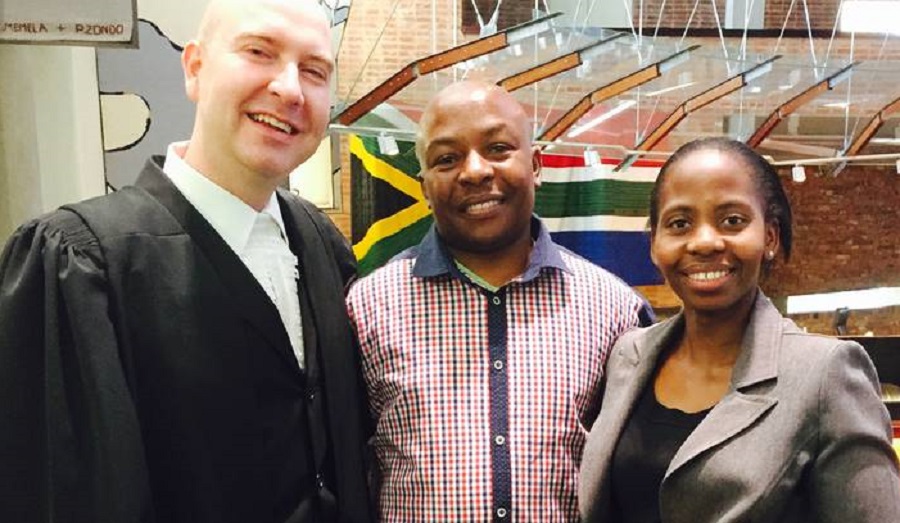
From early childhood, electronics whizz Boswell Mhlongo spent his time tinkering with TVs, broken irons and kettles. In adulthood, after being sentenced to life imprisonment for the murder of a policeman, Mhlongo discovered he was also a computer boff – a talent that enabled him to access an on-line dating site from the confines of his prison cell.
After the Constitutional Court overturned his sentence and conviction and ordered his immediate release in March last year, he married Mavis Sideko, who believed in his innocence from their first chat-room meeting two years earlier.
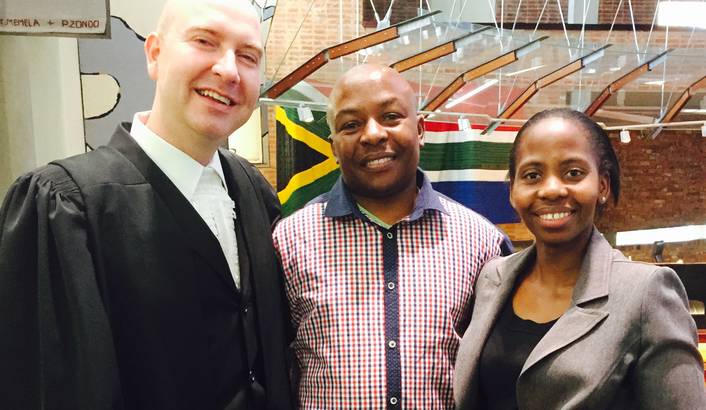
On the first anniversary of his release from Kgosi Mampuru (Pretoria Central prison), the wrongfully convicted former inmate says he’s still recovering from the 13 years he spent behind bars for a crime he did not commit: “It’s not easy to regain everything I lost. There’s a stigma attached to spending time in prison. People don’t trust you, they fear you. The hurt is still there. It’ll probably stay with me forever.”
Though he protested his innocence from the time of his arrest, there were many occasions a despondent Mhlongo believed suicide was his best option. “I spent 23 hours alone in my cell every day for most of the time I was in prison and had plenty of time to plan. I decided to swap my phone cards for Lepinax pills which were given to aggressive inmates to calm them. I accumulated them inside my radio in order to overdose.”
Mhlongo’s first and second attempts to end his life failed and a third landed him in a coma. “I woke up in Kalafong hospital six months later with tubes everywhere. The doctors wanted to switch off those machines but my family refused. I felt bad when I woke up. I’d spent five years unsuccessfully trying to get my trial transcripts which I needed to appeal my case and could see no reason to live. I asked myself over and over why I’d been locked away for life. I couldn’t find any answers….”
‘I LOST EVERYTHING’. THEN HE WAS BEATEN
What is the human cost of judicial error? Mhlongo believes no amount of money will ever compensate him for the trauma he endured after he was sentenced to life imprisonment by North West Judge President Monica Leeuw. Though there are no legal consequences for a judge or members of the bench whose decisions are overturned by the Constitutional Court, Mhlongo is currently weighing up his options regarding a civil claim for damages.
“Serving a life sentence for something you didn’t do is very painful – especially since I’m the kind of person who could never hurt a human being, not even a chicken,” he says. “My time in prison completely destroyed me and my family. I had my own fully paid-off house in Hammanskraal, my own car and a good job. I lost everything, even my will to live.”
When Mhlongo arrived at Pretoria Central C Max, he was assaulted, beaten, made to strip naked and squat, and tortured for no apparent reason by warders using electric shock shields: “I remember one fat Shangaan lady warder who slapped me. I can still see her face and hear her shouting, ‘You killed a policeman!’.” He soon learnt that beatings and assaults were regular occurrences in prison.
Mhlongo immediately began bombarding the Department of Justice, SA Human Rights Commission, Lawyers for Human Rights (LHR), the Public Protector, President Thabo Mbeki, President Jacob Zuma, Ministers Pennuel Maduna, Jeff Radebe and many others with letters proclaiming his innocence. “I received responses from everyone except Judge Leeuw. She was the only one who didn’t respond.”
Apart from Mavis, one of Mhlongo’s six siblings and his mother, who bought him the computer for study purposes with money saved from selling sweets at the side of the road, none of his family or friends believed he was not guilty as charged.
“People think the courts can’t make a mistake,” he says ruefully. “Sometimes warders pretended to believe me but every inmate told them the same story.”
IMPLICATED BY CO-ACCUSED
Luckily for Mhlongo, Mavis understood the fallibility of the justice system as her own father had been wrongfully arrested and charged for no apparent reason.
“He won his case so I knew the police and courts could be wrong. I had no doubts about Boswell. When I first saw his photo before we met, I saw an innocent, lovely, caring person. After three days of talking online, he told me he was in prison. I never even asked what for. I visited him a week later, then every Saturday for two years. When I went to prison for the first time and saw those people inside, I immediately realised this guy doesn’t belong here. He was different.”
With only part-time work promoting soap powder, Mavis devoted herself to Mhlongo’s cause: “I went to Luthuli House every single day for three months asking for help. I told everyone there’d been a huge mistake. I took Boswell’s papers to Minister (of Justice and Correctional Services) Michael Masutha’s office, to the NPA in Pretoria and the Wits Law Clinic. No one could help.”
Until 2012, prior to meeting Mavis every effort Mhlongo had made to access his transcripts and appeal his case had been thwarted. Nonetheless, he consistently maintained that one of his co-accused had implicated him under pressure from the police in exchange for a reward and there was no evidence linking him to the crime.
For succour, Mhlongo poured his heart out on to the pages of a black A4 notebook and sought comfort in religion: “I prayed a lot but it didn’t help. It only calmed my nerves. I could find no answers as to why I deserved this punishment.”
Help finally came from an unlikely source when Zonderwater prison warder Levy Maphakane approached the Wits Justice Project (WJP) for help on behalf of Thembekile Molaudzi, one of Mhlongo’s co-accused who also claimed to have been wrongfully convicted and was unable to access his records.
“Molaudzi was the only inmate whose story I believed in 18 years as a warder,” Mphakane recalls. After the WJP asked LHR to intervene on Molaudzi’s behalf, Judge Leeuw agreed to retranscribe the men’s missing records. “We didn’t commit a crime,” says Molaudzi, “a crime was committed against us….”
Eight years after their conviction, a delay Constitutional Court Judge Edwin Cameron later described as “unacceptable” and “egregious”, seven men Leeuw had sentenced to life in 2004 were finally in a position to appeal their case. When Boswell shuffled optimistically into the North West High Court in leg chains and manacles for his appeal to be heard by a full bench – Justice Ronald Hendricks, Justice Samkelo Gura, Justice Nadia Gutta and Justice Adolph Landman – he had no doubt he would soon be free.
SETTING ‘AN IMPORTANT PRECEDENT’
In a catastrophic failure of the justice system, the appeals of all co-accused –including Mhlongo, Molaudzi and Disco Nkosi, convicted on the recanted hearsay evidence of a co-accused whom the court deemed “a reckless liar” – were dismissed. A subsequent Supreme Court appeal also failed. Though represented by Legal Aid in both appeals, Mhlongo was told no further assistance would be forthcoming.
“There are days in my life I wish I was never born,” Mhongo wrote in his diary just before deciding to go it alone and petition the Constitutional Court – his last port of call before exhausting all legal options.
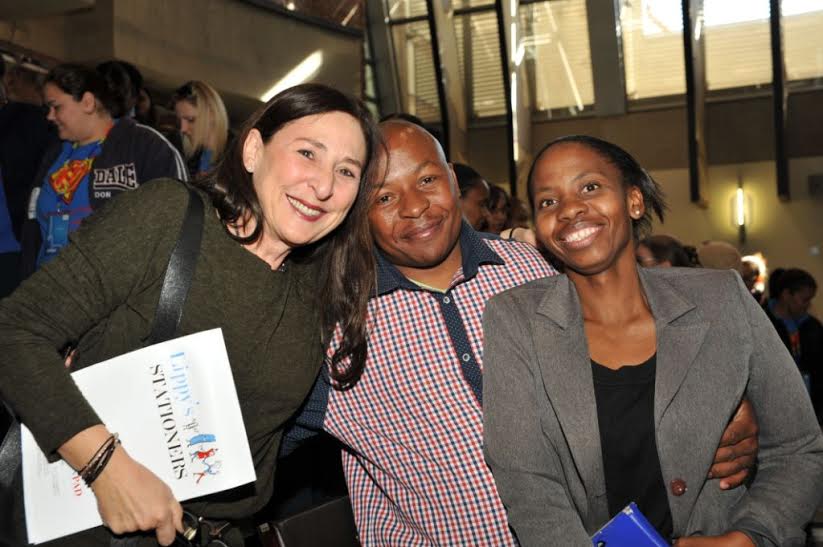
By this time, the model prisoner had completed abuse awareness and anger management courses, written his matric, obtained an advanced computer diploma and was a fully rehabilitated “criminal”. However, there was one glitch: He refused to comply with the terms of a compulsory restorative justice programme requiring him to write a letter of apology to the victim’s family.
“If you don’t show remorse and apologise, your parole will automatically be turned down,” he explains. “How was I going to face those people and apologise for a crime I didn’t commit just because I wanted to get out? I couldn’t do it.”
Instead, Mhlongo turned to a fellow inmate and Unisa law student for help: “I gave him my papers and he told me the next day the State had no case.”
Mhlongo and Nkosi paid their “prison lawyer” R250 to frame their Constitutional Court application, a fee Mhlongo earned fixing warders’ broken electrical appliances. Mavis proceeded to raise enough money to photocopy 27 copies of all the papers the court required for his appeal and took them there herself.
After the Constitutional Court agreed to hear their appeal, the court appointed Pretoria Advocate Donrich Jordaan to represent Mhlongo and Nkosi. Molaudzi appealed separately. While the two men held their breath behind bars, both Jordaan and State Prosecutor Nigel Carpenter told the highest court in the land that the only evidence implicating Mhlongo and Nkosi were extra-curial, out-of-court statements by a co-accused which both advocates argued was unconstitutional. In addition, Jordaan told the court there was no independent corroboration for the statements.
Two weeks later, the court vitiated the men’s sentence and conviction. Molaudzi was released three months later.
“Mhlongo and Nkosi set an important precedent in SA criminal procedure regarding the manner in which criminal cases are now conducted,” notes one constitutional lawyer. “The police and prosecution can’t rely on extra-curial evidence of a co-accused. It’s no longer admissible. Instead, they now have to employ good old-fashioned police work using fingerprints, DNA evidence and witness statements from people who aren’t co-accused.”
‘STILL TORTURED’
Does the story have a happy ending? Says Mavis: “Boswell is still full of anger. I’m even scared of him sometimes. I have to tell myself it’s the situation, not him. It’s going to take a long time for him to heal but I’m going to stand by him until he’s okay. The time inside was really hard for me but it was much worse for him.”
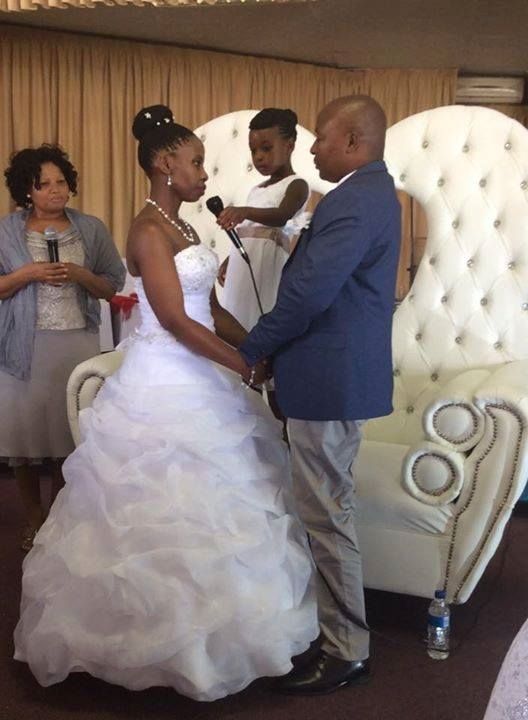
In addition, economic reality is forcing the newlyweds to live apart. While Mavis is employed by the Department of Education as a book packer in Welkom, her husband works as a diesel mechanic instructor in Brits.
“Distance creates problems,” she says. “He’s still tortured by what he went through and the way we live is also a kind of torture. We only see each other once a month. We can’t build our lives together on the phone…”
Though neither the Department of Justice and Correctional Services nor the NPA keep statistics on wrongful convictions, anecdotal evidence suggests there are many other Boswells behind bars, particularly the indigent who, in Mhlongo’s view, mostly accept their fate: “I’m 37 now and I don’t have a child of my own. My Mom’s house is leaking and I want to fix it. I can’t help asking myself what if I wasn’t sent to prison? A year after my release, it’s still impossible for me to understand how the justice system failed us so badly….”
Raphaely is a member of the Wits Justice Project (WJP) which investigates miscarriages of justice related to the criminal justice system. The WJP is located in the University of the Witwatersrand’s journalism department. The article first appeared in the Daily Maverick and is republished with kind permission by the author.